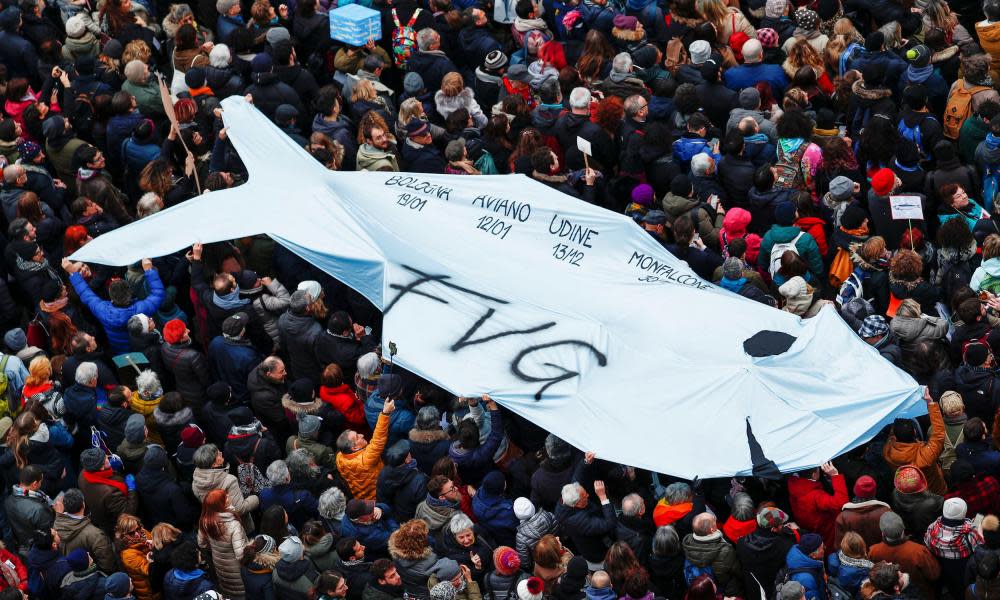Sardines take on League in birthplace of Italian socialism as key election looms

Among the gifts the Sardines – the Italian movement facing off against the far-right politics of Matteo Salvini – received in recent weeks were six works of art by the late Aldo Borgonzoni, a painter and anti-fascist resistance fighter.
Borgonzoni’s granddaughter is Lucia Borgonzoni, the far-right candidate seeking to bring an end to 70 years of leftwing rule in Emilia-Romagna on Sunday in regional elections that will prove an important test for the stability of the national government coalition between the centre-left Democratic party (PD) and the Five Star Movement (M5S), and may decide whether Salvini and the far-right League return to power.
The paintings were donated by her father, Giambattista, a self-described “veteran communist” who said last week “the Sardines are better than my daughter’s party”.
“He gave us another painting today,” Mattia Santori, one of the young founders of the Sardines, told the Guardian on Sunday. “We’re allowed to sell them to raise money for the movement.”
Lucia Borgonzoni, 43, is among the crop of Emilia-Romagna natives who have jettisoned the leftwing ideals of their parents and grandparents and helped bolster support for Salvini’s League, in the region that gave birth to Italian socialism.
The Sardines sprang up in mid-November to counteract the rising popularity of the League, which, together with its allies, the fellow far-right Brothers of Italy and Silvio Berlusconi’s Forza Italia, triumphed in Emilia-Romagna in the 2018 national elections and again in last year’s European parliamentary ballot.

The Sardines – so-called because they have packed out city squares for demonstrations – have managed to galvanise support across the country in recent months, bringing an estimated 40,000 people together in Bologna’s Piazza VIII Agosto on Sunday in the final major show of strength before the Emilia-Romagna local election.
Many believe that a defeat for the PD in Emilia-Romagna could lead to a government collapse as it would increase tensions between the PD and its coalition partner M5S, with more MPs from both absconding as their faith in the alliance dwindles further.
The outcome of the vote will also dictate the future of the Sardines.
“We’ll know what kind of impact this experiment has had after that,” said Santori. “But what we have understood is that, for many people, we are the first real alternative to the populism of the right.”
Final polls before the blackout period began on 11 January put Borgonzoni and the League slightly behind Stefano Bonaccini, the incumbent Emilia-Romagna president from the PD.
Bonaccini, elected president in 2014, has distanced himself from his party’s troubles at national level, focusing his campaign on local issues.
Holding a placard at Sunday’s Sardines demonstration that read, “Salvini you have the delusion of omnipotence”, Giulia Martelli, 29, said: “I really hope we can avoid the worst. I have always supported the PD, even though it has made a lot of mistakes as a party. In Bologna we have a wonderful administration, and that is why I still trust them.”
The PD is counting on its good track record in governing Emilia-Romagna to help it cling to power. The region, home to parmesan cheese and Parma ham, is the second richest in Italy and boasts a rich cultural history as well as an enviable standard of social care.
But that has not prevented a rebellion in towns and villages beyond the defiantly leftwing hubs of cities such as Bologna and Modena. The first inkling that change was afoot came in 2009, when the League, at the time called the Northern League, captured Bondeno, a small town close to Ferrara.
“The problem with the left is that they destroyed all our resources – they closed our hospital and factories,” said Roberto Palazzi, who owns a tyre business in Bondeno. “Life is better under the League – they are bringing back health services and help businesses like mine. The mayor is also close to citizens, he is not someone who hides away. We all have his mobile number.”

To prove it he calls Fabio Bergamini, elected mayor in 2015, and tells him an English journalist would like to speak to him. Bergamini, who also hails from a leftwing family background, arrives within minutes. He is friends with Alan Fabbri, the former Bondeno mayor who leads Ferrara, the first major Emilia-Romagna city seized by the League last June.
“What the left did in the decades after the war was wonderful,” Bergamini said. “Schools for everyone, healthcare for everyone, jobs for everyone – that was the historical left. Then they forgot the working class – the farmers, the factory workers – and started to serve the banks and Brussels. When you think about it, the real left is us.”
Salvini, whose party is the biggest in Italy, has been touring every nook of the region, pledging to banish communism while sharing photos of himself eating tagliatelle bolognese and kissing blocks of parmesan cheese.
“Salvini has been engaging people in forgotten places as he tries to nationalise these elections,” said Mattia Diletti, a politics professor at Rome’s Sapienza university. “Whereas the PD has done nothing to engage society in a different way; they have been in power for so long that they believe they are immortal. But if they lose in a place like Emilia-Romagna then this shows the rage against the political class is stronger than we thought.”
As for the Sardines, Diletti said: “If Bonaccini loses, they lose too.”


